|
2011 Maintenance
Log
4/8/11 | 4/18/11 |
4/20/11 | 4/21/11 |
5/3/11 | 5/8/11 |
5/10/11 | 5/11/11 |
5/13/11
|
Saturday, April
8, 2011
Despite receiving a foot of new snow a week
ago, today seemed to be the day to remove the boat cover.
Most of the new snow had already melted, though there was
still plenty of icy piled-up snow around the boats and in
the shade.
The exterior of the boat was dirty after
the winter, as usual, but otherwise she survived her long
convalescence well. I had no major projects planned
for this pre-season, but would take care of the usual round
of seasonal maintenance over the next few weeks. |
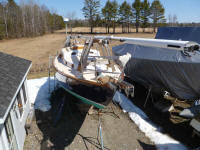
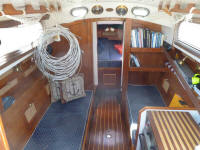
|
Monday,
April 18, 2011
With shop space available for a week
or two in between work projects, I decided to take advantage
of the opportunity and moved Glissando indoors for her
annual brightwork (and other) pre-season maintenance.
The brightwork was in good shape this year (for the most
part), so a couple maintenance coats in most areas would do
the trick. Otherwise, I had a minimal list to attack,
with no significant changes or projects planned this year. |
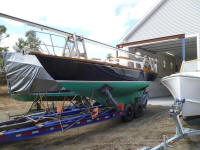
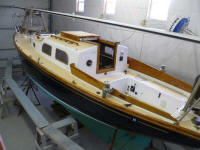 |
Wednesday, April 20, 2011
Over several hours, I
prepared the toerails and other varnished wood on deck for
maintenance coats of varnish, sanding and masking as needed.
Over the past few years, I'd let the anchor platform go, but
decided now to remove the hardware and strip the old varnish
from the top so I could refinish it.
With all the
prep complete, and the boat vacuumed and cleaned up, I
applied the first coat of varnish to all surfaces. |
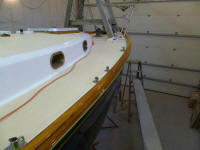
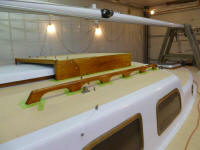
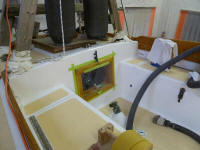
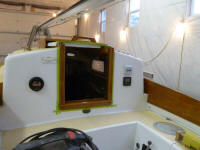
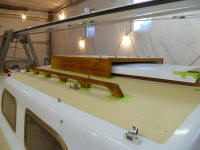
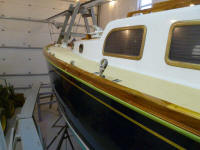 |
Thursday, April 21, 2011
Second maintenance coat. |
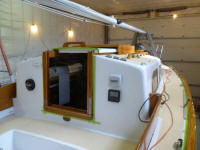
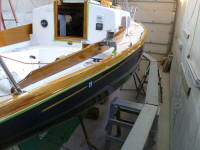
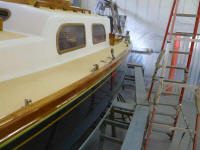
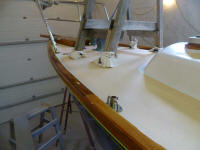 |
Tuesday, May 3, 2011
After going away for a week's
vacation, I got back to the preparations as required.
I'd enough varnish on most of the brightwork, so I removed
the masking tape, leaving only the anchor platform and
several loose pieces (companionway boards and lazarette
hatch). Late in the day, I varnished these pieces. |
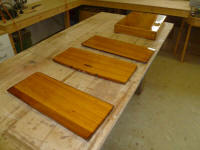 |
During much of the day I
worked on the decks, cleaning up the white-painted areas,
polishing the port glass, and other related chores. I
also began to rerig the mast. Suddenly there was a bit
of urgency to the whole process, as just this day I
scheduled launching for May 10--earlier than I usually like,
but it was a case of either getting ready now, or being
subject to delays as the boatyards got scheduled during the
busiest part of the season. I thought it'd be better
to go sooner than later, and I could easily be ready in time
since I'd planned on having the boat in the shop most of the
week anyway. |
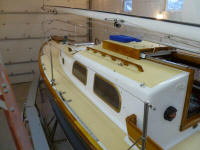
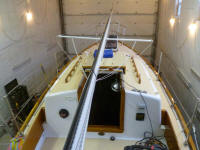 |
Sunday,
May 8, 2011
Over the course of the week, in and
amongst other jobs and projects, I wrapped up most of the
preparatory work getting the boat ready to launch, including
various rigging chores, bottom paint, engine maintenance,
and other tasks. |
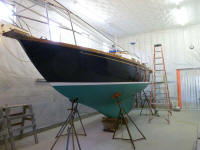 |
With most of the indoor
work complete, I moved the boat back outside late Friday so
I could spend time over the weekend working on the engine
and cleaning up the boat. |
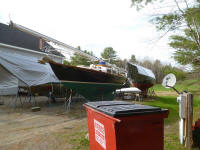 |
Saturday, I prepared to run
the engine. I installed a new impeller--standard
neoprene this time, as I'd found the blue nitrile impellers
that I used to like had suffered greatly from poor quality
control (apparently), as both of the past two seasons had
seen my blue impellers perform poorly, with brittle material
that cracked and broke at the vanes. I detailed the
impellers' condition in both
October 2010
and 2009 during my winterizing procedure.
During last
season, I noticed that my exhaust seemed to contain more
smoke than usual; I'd become used to the engine burning
cleanly, so this was a concern throughout the season.
However, I realized after seeing the impeller's condition at
the end of the year that what I'd been seeing was probably
steam, not smoke, as I imagined the impeller had been in
less than optimal condition the entire season (though it was
brand new in May).
In the event, once I'd installed
the new, stock neoprene impeller and made other
preparations, I fired the engine; it started immediately and
ran well, with no evidence of smoke or steam in the exhaust
now, reinforcing my theory about last year's performance. |
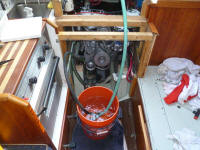
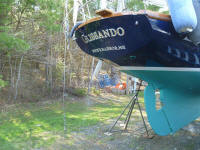 |
After running the engine
for a bit, I shut down and changed the oil and filter.
My oil change pump featured a larger hose into which a
smaller hose (to fit into the oil dipstick tube) was fitted
and ostensibly secured with a clamp. Unfortunately,
when I started the pump this tenuous connection failed, but
not until the pump had already managed to draw enough oil
into the hose to blow it all over the engine room.
This did not amuse me, but somehow I managed to clean it up
and continue removing the old oil before replacing it with
new.
With the engine work complete, I loaded
additional gear on the boat and washed the decks and hull,
more or less completing my pre-launch task list. |
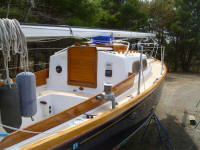
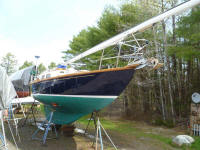 |
Tuesday, May 10, 2011
On a nasty, breezy, raw day,
Glissando was picked up for transport to a boatyard on
the coast, where I'd arranged to have her mast stepped and
launched. The high winds and lousy forecast for the
next couple days would probably mean a delay in the stepping
and launching, which was fine with me since this was so
early in the season anyway. In any event,
the boat was on her way to another season!
Once the boat was launched, I planned to keep her briefly in
a slip at the yard so I could get things squared away and
await better weather to bring her the 20 miles to her
mooring in Buck's Harbor. |
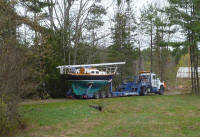 |
Wednesday, May 11, 2011
I received word that the boat
had been stepped and launched, so late in the day I drove
down to check things out. The boat was in one piece
and so was the mast, but I noticed that the stays on the
port side had been installed backwards, with the lower on
the forward chainplate and the upper on the aft--this
despite the prominent note I left to clarify this and avoid
this common boatyard mistake (the stays were correctly
installed on the starboard side). I'd have to call the
yard in the morning to take care of it, as it was far too
windy to consider doing it while I was there.
Otherwise, the boat and spar were in good order, and after
fine-tuning the docklines and fenders and checking
everything over, I departed. Still ahead I'd need to
install the boom and sails and get things ready to go; the
forecast wasn't looking particularly agreeable for the
delivery anytime this week, but I'd take it one day at a
time and hoped to get the boat ready in one more visit so I
could go at any time. |
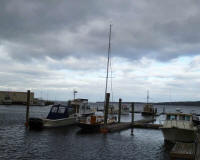
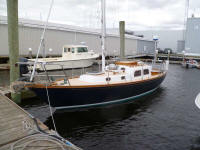 |
Thursday, May 12 - Friday, May 13, 2011
It had been
windy, gray, and unsettled all week. However, by
Thursday after work the weather was improving, and Friday
featured a favorable forecasts, a short window sandwiched
between bouts of unsettled (and typical May) weather.
Hoping to deliver the boat to her mooring on Friday, I
used Thursday evening to do some setup on the boat.
I'd called the boatyard Thursday morning to mention the
incorrectly-connected stays on the port side, but when I
arrived I noticed they'd not switched them. So
swapping the two stays was my first order of business.
I used the main and jib halyards to support the mast to port
while I undid the two stays and switched them as quickly as
I could.
Afterwards, I installed the boom,
mainsail, jib, and associated rigging and got the boat more
or less ready for "sea", As I installed the mainsail,
I realized I'd forgotten the full battens at home, which
meant it wasn't yet ready to use. I also brought down
dinghy and outboard and
sorted out other gear, and ran the engine for a while.
It was a beautiful evening, finally calm after days of
nagging northerlies, and I was tempted to drop the lines and
go, but knew I'd never have enough time before dark.
I'd hoped to scrub the decks and wash the hull--both of
which were a mess after a rainy-day road transport on
Tuesday and the inevitable boot marks from the mast
stepping--but there was not yet water on the docks. |
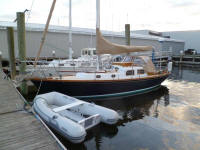
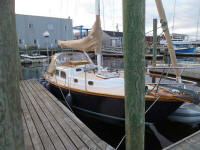 |
Friday morning, I arrived
at the boat at first light, wanting to get underway and the
boat delivered without requiring the whole day, and to make
scheduling a ride home easier. It was clear, mostly
calm, and cold, about 40°. I brought the mainsail
battens with me this time, but as there was no wind--nor was
there expected to be much--I didn't waste time installing
them now, since I expected the delivery would be under power
anyway. What wind there was was from the NNE, right on
the nose and light. |
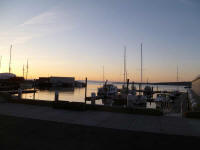 |
It was an uneventful and
boring delivery; 21.8 miles in 4 hours, 50 minutes, with
chilly headwinds and ambient air temperatures.
Eventually, I had on: a t-shirt; long-sleeve t-shirt;
heavy sweatshirt; hoodie sweatshirt (I forgot to bring a
hat); fleece-lined flannel overshirt; fleece-lined nylon
shell; gloves. I must have looked like the Michelin
Man.
Inevitably, I had the tide against me the whole way, slowing
me to as little as 3.8 knots over the ground (thankfully
briefly), but with speeds otherwise averaging about 4.5
knots. The light 3-5 knot NNE wind--the direction I
was headed--briefly blew as high as 10-12 knots true on the
east side of Isleboro before dying altogether for the
remainder of the trip.
The weather was interesting.
As I motored up east Penobscot Bay, a bank of low
clouds--which I'd seen hovering in the distance all
morning--advanced towards my position, giving me the
interesting opportunity of having vastly different weather
on each side of the bow. The two photos below were
taken one after the other and show this dichotomy.
Later, as I neared my destination, the clouds dissipated. |
Left: View to Port.
Right: View to Starboard.
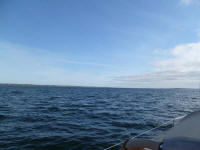
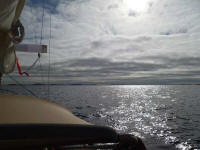 |
Eventually, I reached my
mooring at Buck's Harbor. Even though I knew I was
early in the water this year, I was amused to find the
harbor essentially echoing and empty, with only four other
boats on moorings (not counting several resident lobster
boats). With an hour or so to pass before my ride
arrived, I cleaned up the boat, installed the mainsail
battens, and got things slightly more squared away before
departing. I was happy to have the boat in and on the
mooring where I knew she'd be safe. |
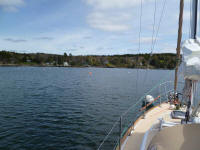
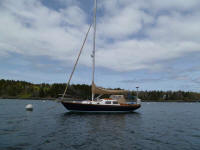
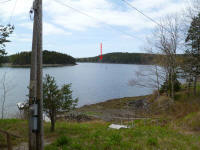 |
| |
| |
|